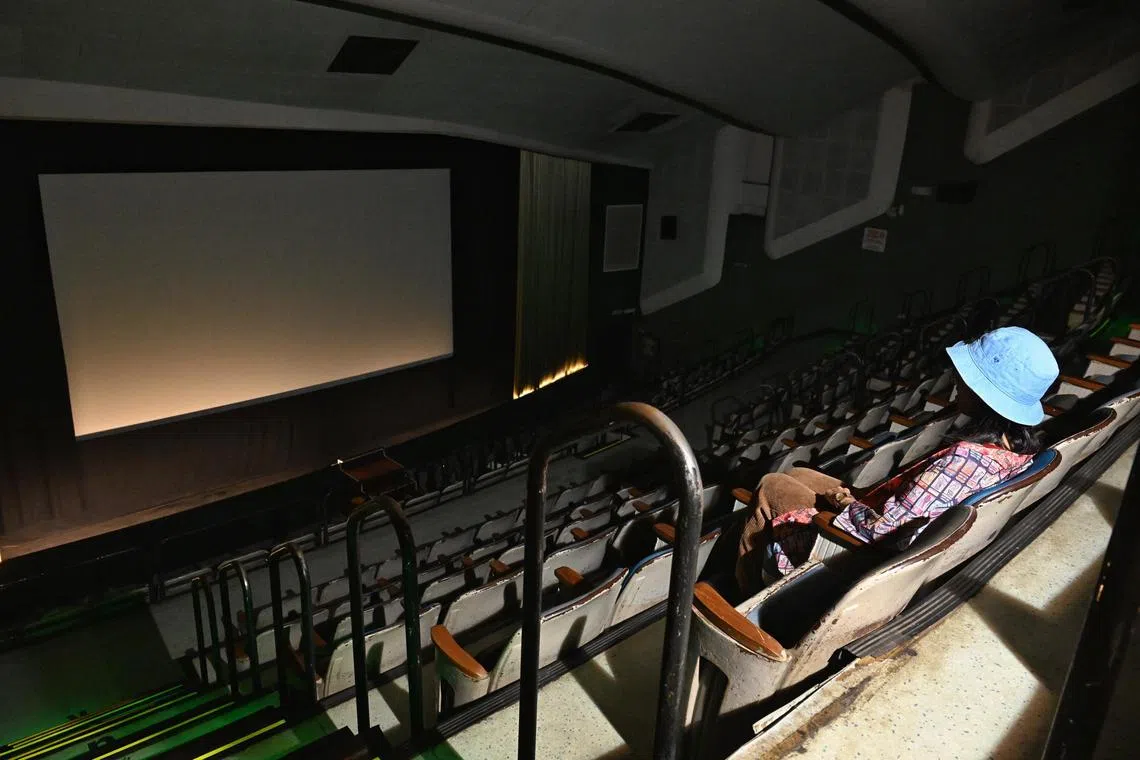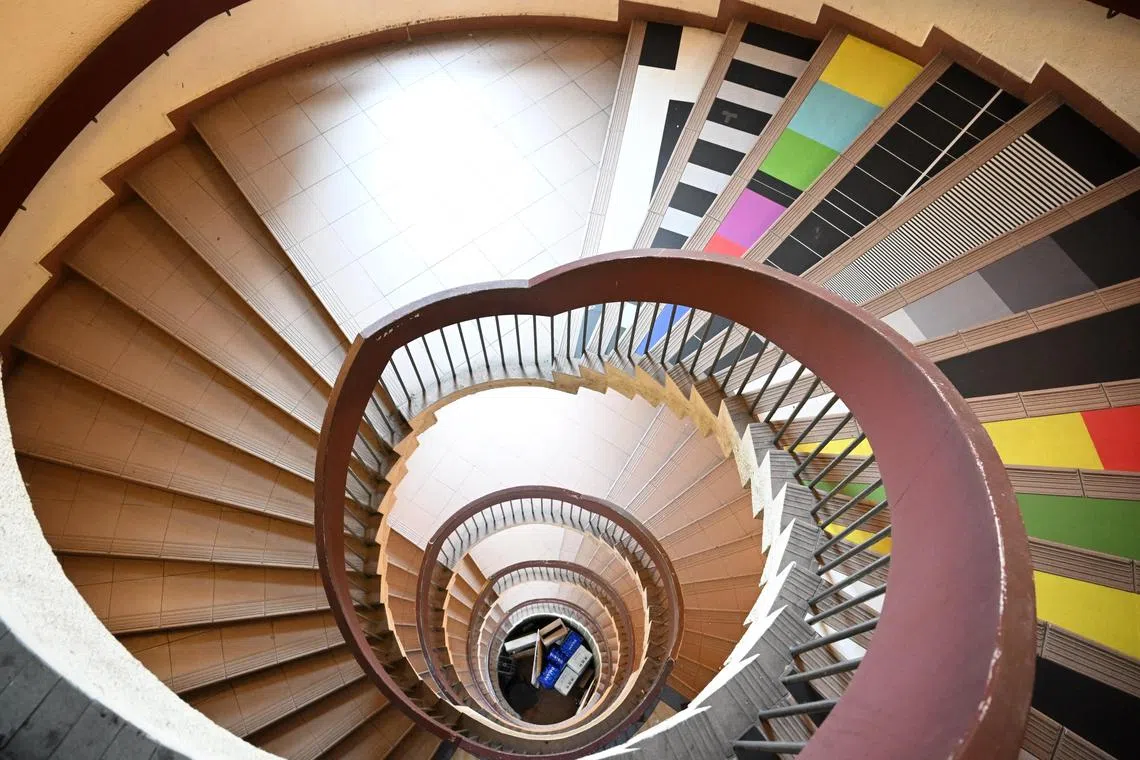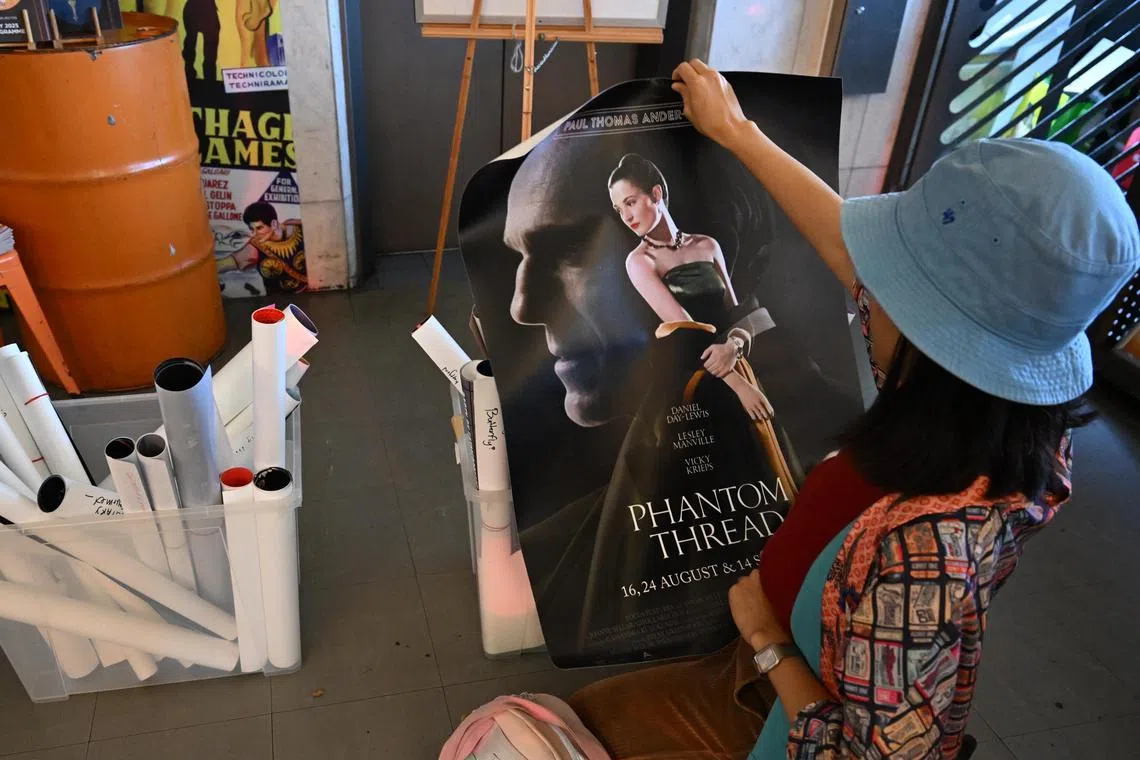Viewpoint: Why Singapore cinema The Projector couldn’t escape financial reality, despite being cool
Sign up now: Get ST's newsletters delivered to your inbox

Film buff Adora Tan, 28, reminiscing her movie experiences at The Projector on Aug 19. She visited the cinema upon receiving news of its closure.
ST PHOTO: CHONG JUN LIANG
SINGAPORE – It is heartbreaking. From its founding in 2014, I have reported on indie cinema The Projector.
Its sudden closure on Aug 19, with no warning, proves one more rule about the leisure business in Singapore: Hipster credibility is not enough.
The loss of the cinema at Golden Mile Tower
Through its film festivals and other events, it championed causes, from LGBTQ+ to European film to various charities.
It is the loss of a venue that tried to make cinema-going a full night out, complete with a compelling food selection, live music and a bar, with the menu often matched to the films.
Over its 11-year history, The Projector became a brand synonymous with these qualities: cosmopolitan, tasteful, eclectic, cool.
As it turns out, being cool in Singapore – whether the business is noodles, doughnuts, fashion or film screenings – is no guarantee of long-term success. Such is the brutal reality of the leisure industry in Singapore. Being cool or hip means being in a niche.

A sign announcing its closure is seen at The Projector on Aug 19.
ST PHOTO: CHONG JUN LIANG
Having a mainstream audience is tough enough. In the past few years, veteran cinema operators like Filmgarde and Eng Wah have exited the business. Cathay Cineplexes has closed outlets
What is interesting about The Projector’s immediate closure on Aug 19 – the same day that it announced it was closing – is how sudden and unexpected it was. Film distributors I spoke to had no idea, and were told only hours before the media statement was sent at noon on Aug 19.
Like me, they had believed that the cinema’s loyal core of supporters – many of whom donated money to help it ride out the Covid-19 pandemic restrictions – would keep the place financially stable for years to come.
The only iceberg on the horizon was the en-bloc sale of its birthplace
But as many Gen Z hawkers have found out, social media buzz can take you only so far. For now, all that remains is to tie loose ends.
Membership cardholders will have to wait for liquidators to be appointed before refunds can be processed. There will also be a meeting for the creditors on Aug 29, according to a notice published in the Government Gazette on Aug 19.
As for alternatives, festival and art-house film distributors say they will work with Golden Village and Shaw.
The big players are more risk-averse than The Projector – an award-winning three-hour study of depression might be a financial risk that mainstream cinema chains are not willing to take – but there is wiggle room. And where there is room to negotiate, there is hope.
The Projector was Instagrammable from Day 1, when it opened on a portion of the site of the former Golden Theatre, itself a relic that opened in 1973 inside the Brutalist structure in Beach Road.
The boutique cinema had retro charm in spades – its halls had cast-iron seat frames, neon signage and a dramatic spiral staircase that became a selfie hot spot.

The iconic spiral staircase at The Projector photographed on Aug 19.
ST PHOTO: CHONG JUN LIANG
Its founders Karen Tan, Sharon Tan and Blaise Trigg-Smith had a background in urban regeneration and conservation through their consultancy Pocket Projects, so making ageing structures relevant again was in their blood.
They had worked out that for a boutique cinema to work, it could not just be a cinema – it also had to be a cultural hub where enthusiasts hang out with like-minded people. That is the spirit that animates places like BFI Southbank in London, La Cinematheque in Paris, Kino International in Berlin and the Alamo Drafthouse cinemas in the United States.
And for 11 years at least, it seemed to work. Here was a place that defied the cruel economics of Singapore, where specialist cinemas come and go.
Even before the age of social media, boutique cinemas existed. But, like The Projector, they vanished – and this happened at a time when the cinema-going habit was still strong.
The Picturehouse at the Cathay Building in Handy Road opened in 1990, but went away in 2000 with the redevelopment of the site. Sinema Old School at Mount Sophia was a micro-cinema that opened in 2007 to screen local and independent films, but vanished in 2012 when its lease expired.
Cinema-going as a leisure activity has been falling off since 2011, because of piracy, streaming, changing lifestyles and other reasons. But note that The Picturehouse and other specialist screening rooms of the 1990s and 2000s came and went at a time when going to watch a film was something everyone did.
To be fair, The Projector was not a flash-in-the-pan influencer-driven phenomenon. While it was Instagram-cool for a long time, it also had solid fundamentals, such as respectable food and beverage options, a generous policy towards helping small social and arts communities and a programming team that was genuinely interested in good non-mainstream films.

The underside of a seat in The Projector’s cinema hall on Aug 19 bearing the title of the 2005 film Good Night, And Good Luck, which takes on new meaning after the indie cinema announced its sudden closure.
ST PHOTO: CHONG JUN LIANG
Mr Thomas Chia, director of Lighthouse Film Distribution, is familiar with The Projector’s enthusiasm first-hand.
He began working with it in the midst of the Covid-19 pandemic. In 2021, he was looking for a place to screen the Japanese film Drive My Car. He knew it was going to be a tough sell because it was a sensitive drama, three hours in length, during a time when cinemas were in financial peril.
The Projector picked it up and Drive My Car went on to win a Best International Feature Film Oscar in 2022, and became the first Japanese film to receive a Best Picture nomination.
Since then, Mr Chia’s films such as the Oscar-winning animation Flow (2024) have been screened there. His latest offering, the Japanese culinary drama Grande Maison Paris released on Aug 7, was still showing when The Projector shuttered.
Without the cinema, he will have to tweak the way he acquires films so the big players will be more willing to exhibit them. “I enjoyed working with The Projector because it was willing to take risks and screen films like Drive My Car when other cinemas would not. In future, I will have to be more mindful of the commercial needs of cinemas – making sure that the length of the movie and the stars have more broad appeal,” he says.
Teacher Adora Tan has been patronising The Projector since 2016, when she was a student at Nanyang Technological University. When a friend messaged her about the closure of her favourite cinema on Aug 19, the film buff rushed there at 3pm after work.

Film buff Adora Tan taking the posters given out at The Projector on Aug 19.
ST PHOTO: CHONG JUN LIANG
A group of supporters had already gathered there to say goodbye and pick up mementos. Ms Tan gathered brochures and a menu from the Intermission Bar, which she says she will treasure.
The 28-year-old adds: “The mood was sombre, but the cinema staff were approachable and we started sharing memories of the place. I was grateful they let me have a final look.”



